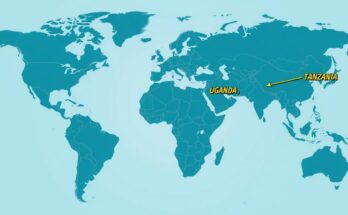As the civil war in Sudan enters its 18th month, a recent offensive by the Sudanese Armed Forces against the Rapid Support Forces signals a resurgence in conflict. Over 20,000 people have reportedly died, and approximately 10.89 million individuals are internally displaced. Ceasefire efforts have repeatedly failed, and battles have evolved to include ethnic conflict and geopolitical factors. As regional tensions rise alongside mass displacements, the humanitarian crisis grows more profound, necessitating immediate international intervention to prevent further deterioration.
As of October 2024, the civil war in Sudan has escalated dramatically, particularly following the major offensive launched by the Sudanese Armed Forces (SAF) against the paramilitary Rapid Support Forces (RSF) on September 26. This renewed assault adds to the already grim humanitarian situation that has unfolded over the past 18 months since the conflict began, marked by over 20,000 fatalities and an alarming 10.89 million internally displaced persons (IDPs) according to the International Organization for Migration. Despite ongoing international efforts to broker ceasefire arrangements and peace talks, these initiatives have largely failed, with the situation worsening in multiple regions, especially in Darfur where famine has been declared in some camps. The conflict, which initially stemmed from a power struggle between fighting factions led by SAF’s Abdel Fattah al-Burhan and RSF’s Hamdan Dagalo, has broadened to encompass ethnic violence and external influence, complicating any potential resolution. With both sides unwilling to yield power, the war appears increasingly entrenched, suggesting a prolonged and devastating trajectory for the nation. The civil war in Sudan serves as a complex case of military rivalry that has spiraled into a multifaceted humanitarian and political crisis. Initiated by a power struggle between military leaders, this conflict has not only driven devastation at the national level but has also resulted in significant regional implications. Neighboring countries, particularly Chad, South Sudan, and Ethiopia, are now grappling with thousands of refugees while facing their own ethnic tensions exacerbated by the war. The involvement of external actors, along with an ongoing arms embargo, has not succeeded in restricting weapon transfers, thereby contributing to the conflict’s persistence. As foreign mediation wanes and national actors remain at loggerheads, the situation calls for an urgent reassessment of international engagement strategies with Sudan. In light of the current crisis in Sudan, international observers and stakeholders have expressed increasing concern regarding the humanitarian fallout, as evidenced by reports of wide-scale displacement and the threats of food insecurity affecting over half of the population. The continuous cycle of violence has created a dire atmosphere where ceasefire talks and peace arrangements have led to limited progress. Faced with entrenched military positions and contrasting territorial claims, the likelihood of a diplomatic resolution remains bleak. As the war drags on, there are fears that Sudan may face partition similar to Libya’s disintegration, underscoring the need for immediate international attention and action. With the conflict commanding far less media coverage than other global crises, the potential for addressing and alleviating the dire conditions in Sudan appears diminished. Thus, the existing civil war in Sudan not only highlights the profound humanitarian crisis facing its citizens but also underscores the global community’s challenge in navigating the complexities of multifaceted civil wars, where local dynamics and international interest often collide.
The civil war in Sudan emerged from a struggle for power between two military factions: the Sudanese Armed Forces (SAF) and the paramilitary Rapid Support Forces (RSF). The conflict began in April 2023, stemming from tensions between military leaders Abdel Fattah al-Burhan (SAF) and Hamdan Dagalo (RSF). As the conflict escalated, it resulted in widespread violence and a dire humanitarian crisis. Currently, the UN and various humanitarian organizations are reporting catastrophic displacement figures along with a heightened level of violence, including war crimes committed by both parties. Continuous international efforts have attempted to mediate a peace process, but all efforts have failed so far, leading to an urgent humanitarian disaster across the country. Various external actors have also become involved, complicating the conflict further as different factions gain international backing. Issues of ethnic militias have emerged, altering the dynamics on the ground, while humanitarian access remains critically restricted. The implications of this conflict extend beyond Sudan’s borders, increasing regional instability and drawing attention from international entities concerned about evolving ethnic clashes and refugee influxes.
The civil war in Sudan, fueled by unresolved power struggles and external influences, presents a challenging landscape for peace and humanitarian relief. With ongoing military offensives and little indication of a diplomatic resolution, the humanitarian crisis continues to deepen. Current trends suggest that without a dramatic shift in strategy or commitment to negotiations, the fighting may persist indefinitely, impacting not only Sudan but also regional stability in neighboring countries. This situation necessitates urgent international attention to restore peace and provide humanitarian assistance. The plight of the Sudanese people must not be overlooked in the broader context of global crises that seem to dominate current discourse.
Original Source: www.thehindu.com




